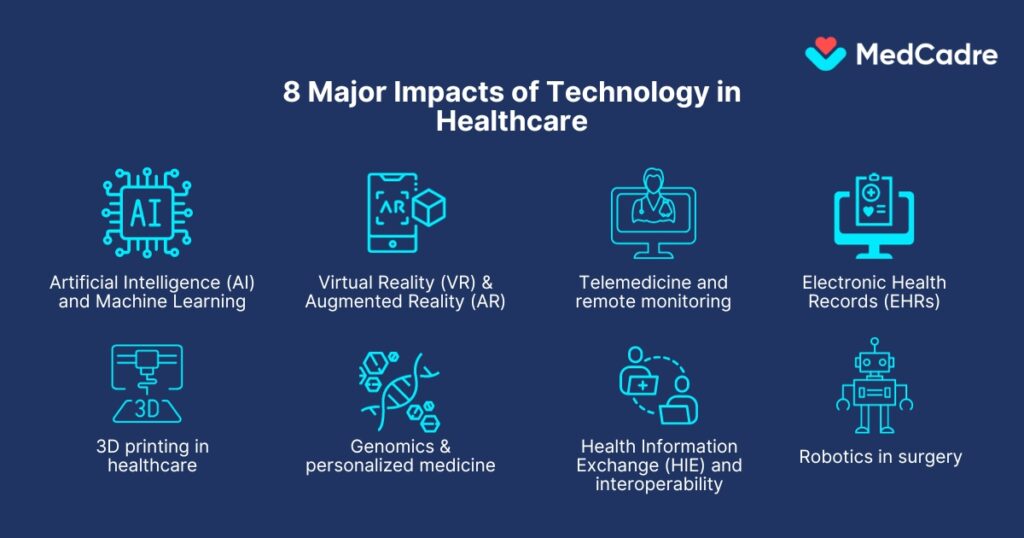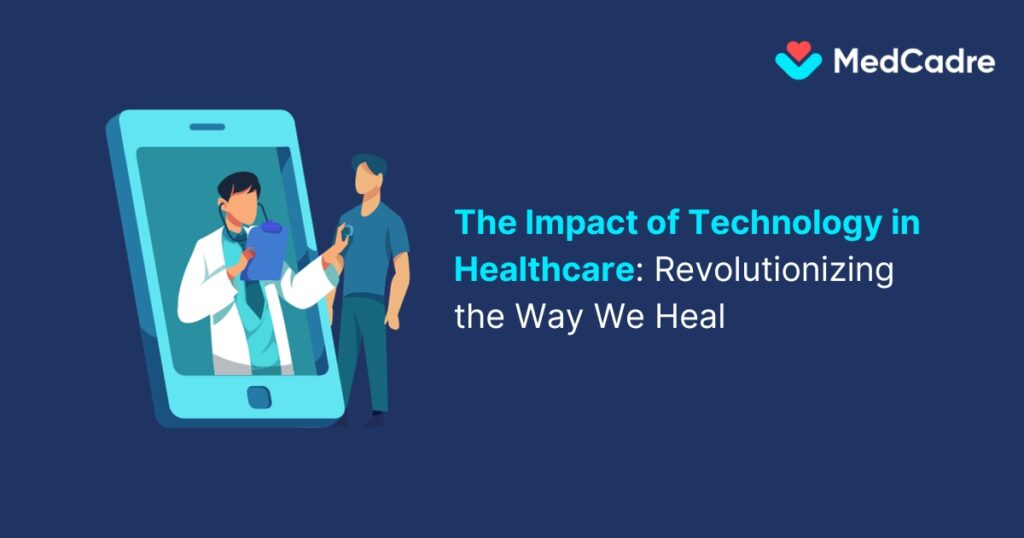Technology has been at the forefront of transforming every aspect of our lives, and healthcare is no exception. In recent years, the healthcare industry has witnessed a revolution driven by technological advancements. From improved patient care to streamlined administrative processes, technology has left an indelible mark on the way we deliver and receive healthcare services. This article explores the profound impact of technology in healthcare, highlighting the key areas where advancements have significantly improved patient outcomes and the overall quality of healthcare.
Top technology impacts on healthcare

1. Telemedicine and remote monitoring
One of the most prominent technological advancements in healthcare is telemedicine, which has made healthcare services accessible to individuals regardless of their geographic location. Telemedicine allows patients to consult with medical professionals via video conferencing, while reducing the need for physical office visits. This is particularly beneficial for patients in rural or remote areas who may not have easy access to health and wellness facilities.
Remote monitoring devices, such as wearable fitness trackers and medical-grade sensors, enable healthcare providers to collect real-time data on a patient’s vital signs and overall health. This technology has proven invaluable for managing chronic conditions, while allowing for early intervention and reduced hospital admissions.
2. Electronic Health Records (EHRs)
The transition from paper-based patient records to Electronic Health Records (EHRs) has been transformative for health and wellness sector. EHRs provide healthcare professionals with immediate access to a patient’s medical history, test results, and treatment plans. This streamlined access to information improves the accuracy and efficiency of care, while reducing the risk of medical errors and ensuring that patients receive the most appropriate treatment.
Furthermore, EHRs facilitate data sharing between healthcare providers, improving care coordination and reducing duplication of tests and treatments. Patients can also access their records online, increasing transparency and engagement in their own health and wellness.
3. Artificial Intelligence (AI) and Machine Learning in healthcare
Artificial Intelligence and Machine Learning have brought about significant advances in the diagnosis, treatment, and drug development processes. AI algorithms can analyze vast datasets to identify patterns and correlations that might be difficult for human healthcare professionals to detect. Machine learning models can predict disease outbreaks, allowing for early intervention and resource allocation.
In the realm of medical imaging, AI has revolutionized the interpretation of X-rays, MRIs, and CT scans, leading to faster and more accurate diagnoses. Also, AI-powered chatbots are increasingly used to provide instant health-related information and support, reducing the strain on health and wellness call centers.
4. Robotics in surgery
Robot-assisted surgery is another major technological breakthrough in healthcare. Robots allow for precise, minimally invasive procedures with smaller incisions, reduced pain, and faster recovery times. Surgeons can control these robots with high precision, while enhancing their capabilities and expanding the range of complex surgeries they can perform.
Robotic surgery has gained popularity in various specialties, including urology, gynecology, and orthopedics. The continuous development of this technology promises even greater advancements in the surgical field.
5. Health Information Exchange (HIE) and interoperability
Health Information Exchange (HIE) systems enable the sharing of patient information between different healthcare organizations. Interoperability, or the ability of different systems to work together, is a critical component of HIE. When medical professionals can access and share patient information seamlessly, it leads to more informed decision-making and improved patient care.
Additionally, HIEs have proven crucial in times of emergencies or natural disasters, ensuring that critical patient data is available regardless of a patient’s location.
6. 3D printing in healthcare
The application of 3D printing in healthcare has opened up new possibilities in the production of personalized medical devices, prosthetics, and even human tissue. Also, customized implants and medical models created through 3D printing can greatly enhance patient care and recovery.
3D printing has been used to create patient-specific orthopedic implants, dental prosthetics, and even organs. Thus, this technology holds immense promise for the future of healthcare as it continues to advance.
7. Virtual Reality (VR) and Augmented Reality (AR)
Virtual Reality and Augmented Reality are being used in various health and wellness applications, such as pain management, medical training, and patient education. VR can help patients manage pain and anxiety by immersing them in soothing environments, diverting their attention from discomfort.
In medical training, AR and VR enable medical professionals to practice surgical procedures in a safe and controlled virtual environment, enhancing their skills and confidence. Medical students can also use AR to visualize anatomical structures in 3D, improving their understanding of complex medical concepts.
8. Genomics and personalized medicine
Advancements in genomics have paved the way for personalized medicine, where treatments and medications are tailored to an individual’s genetic makeup. Genomic sequencing allows healthcare providers to identify genetic predispositions to certain diseases, predict responses to specific treatments, and develop more effective therapies.
The potential for personalized medicine is vast, with the promise of reducing adverse drug reactions and optimizing treatment outcomes. As technology continues to improve, genomics will play an increasingly significant role in health and wellness sector.
Conclusion
Technology has fundamentally reshaped the healthcare landscape, while enhancing patient care, improving efficiency, and driving medical breakthroughs. From telemedicine to robotic surgery, electronic health records to genomics, the impact of technology in healthcare is undeniable. The ongoing development of new technologies promises to further transform healthcare, making it more accessible, accurate, and patient-centric. Embracing these innovations is essential for the continued improvement of healthcare services and the overall well-being of society. As we look to the future, it is clear that the synergy between healthcare and technology will continue to be a powerful force for positive change.
MedCadre for your future
To thrive in this dynamic field, consider joining Medcadre. This platform is dedicated to connecting healthcare professionals with innovative healthcare institutions, exploring the many opportunities that technology has created. Medcadre is at the forefront of this healthcare technology revolution, providing a bridge between healthcare professionals and the cutting-edge solutions that are shaping the future of medicine. Embrace this exciting journey and contribute to the future of healthcare through technology with Medcadre, apply now.


